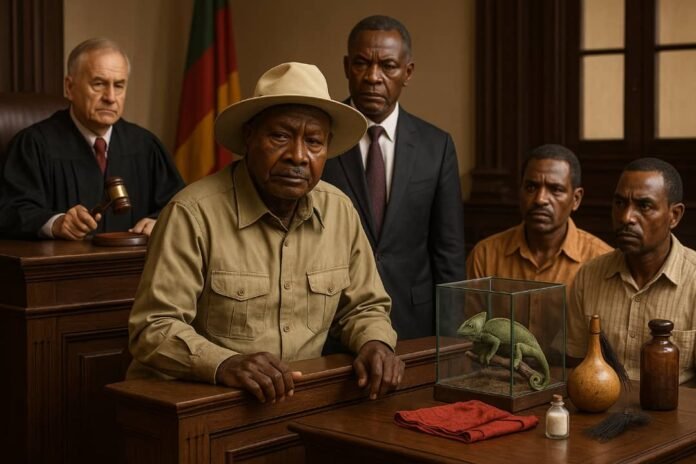By Isaac Christopher Lubogo
Scene I: The Courtroom of the Republic
The gavel strikes. The High Court of Africa is in session. It is no ordinary case: The Republic vs. The Witches.
At the bar stands President Yoweri Kaguta Museveni, not as Head of State, but as complainant. Across from him, two bewildered men from Zambia—Leonard Phiri and Jasten Candunde—already convicted in Lusaka for plotting against Hakainde Hichilema. Their chameleon, caged and restless, sits on the evidence table beside gourds, red cloth, and bottles of powder.
Presiding is Justice Posterity, robed not in black but in time itself. The gallery is packed: lawyers, chiefs, ordinary villagers, and even a few startled goats tied to the court veranda.
Scene II: Museveni Takes the Stand
“Your Lordship,” Museveni begins, his voice the mix of history and fatigue. “I have fought coups, rebels, and imperialists. I have tamed the economy, the army, even the cow. But now they say witches with a chameleon threaten me? Surely this is not serious!”
The courtroom chuckles. Yet the judge raises a hand: “Mr. President, the law says even impossible attempts may be punished. Did you feel threatened?”
Museveni pauses. “Well… I did not feel threatened, but I do not take such matters lightly. In Africa, the unseen can move armies more than manifestos. If Hichilema faced it in Zambia, why not me in Uganda?”
Scene III: The Zambian Witness
President Hakainde Hichilema rises, called as witness by the prosecution. “My Lord,” he says, “I was told I would die within five days by ritual charm. They were found with my photograph, a live chameleon, and powders. I did not die, as you see. But the law convicted them because intent and acts matter, not whether sorcery works.”
He turns toward Museveni. “My brother, the presidency is not only guarded by soldiers. It is haunted by belief. If you dismiss witchcraft, the people may say you are naïve; if you embrace it, the law becomes comedy.”
Scene IV: The Accused Speak
Leonard Phiri, trembling, mutters: “We only did what we were told. A politician’s brother hired us. We meant no personal harm to Hichilema—or Museveni. We believed charms would do the work.”
Candunde adds, “In our culture, the unseen is as real as the seen. If your law punishes us, it punishes our worldview.”
The chameleon hisses, as if giving evidence of its own.
Scene V: Philosophical Cross-Examination
Justice Posterity leans forward:
“Is the Republic to be guarded against charms or against violence?”
“Should the Constitution of Uganda tremble before gourds and goat tails?”
“Or should we reform our laws so that belief is private, but harm is public?”
The courtroom is silent. Museveni, usually the lion, looks thoughtful. Even Hichilema, the economist, nods gravely.
Scene VI: Judgment
The judge lifts the gavel:
> “Presidents of Africa, you cannot both boast of modern constitutions and fear the whispers of ashes. Punish threats, punish violence, punish fraud—but do not prosecute shadows. For if State House trembles not from ballots or bullets but from charms, then the Republic is reduced to theatre, and you yourselves are actors in a comedy of fear.”
The gavel falls. The courtroom erupts—not in laughter, not in anger, but in the uneasy murmur of a continent that still cannot decide whether the greatest threat to its presidents is the gun, the ballot, or the chameleon.
Epilogue
In the annals of law, this case will not be remembered for its verdict but for its symbolism: that even Africa’s strongest presidents may one day stand in court, not against generals or rivals, but against witches—and discover that the real trial is not of curses, but of the law itself.








